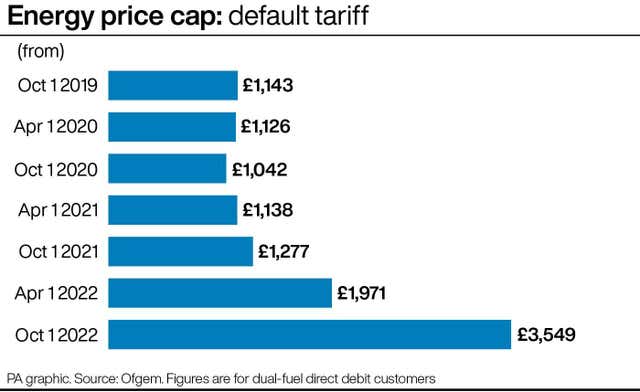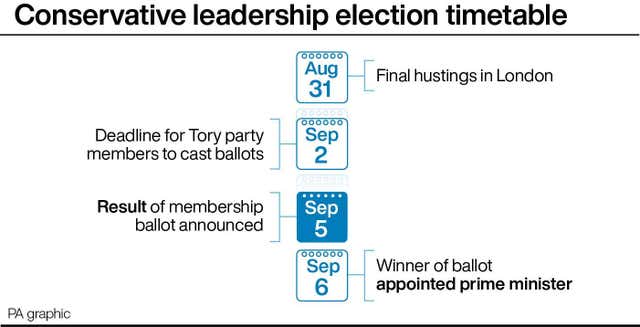
James O'Brien 10am - 1pm
29 August 2022, 18:44

The country is still in the dark about exactly how either Tory leadership candidate would act to take the sting out of sky-high energy bills.
The Liz Truss camp has said the Tory leadership frontrunner is leaning towards targeted support over help for all to ease the cost-of-living crisis, but maintained she is not “ruling anything out” at this stage.
As the contest enters its final week, the country is still in the dark about exactly how either candidate would act to take the sting out of sky-high energy bills this winter.
Conservative minister Victoria Prentis insisted the Government is drawing up options for the next prime minister and argued that targeted support is needed.
“I would like to reassure that there are many, many different plans being worked on by civil servants and ministers at the moment, and whoever comes in as the next Conservative leader and our next prime minister will have the background work ready and will be able to make those difficult choices very quickly and before it’s needed,” she told Times Radio.
“We need to make sure that while we will be providing some general support, … most of our support goes to those really vulnerable households”.
But former chancellor Alistair Darling condemned the Government for “fiddling around with small measures” as he called for bold action to avoid a “lethal cocktail” of skyrocketing energy prices, recession and high inflation.
He told BBC Radio 4’s Today programme: “You need something significant and substantial and you need it now, because people’s bills are going to start coming in in a few weeks time.
“If you don’t do that then you have the risks that I’ve been describing, that the economy will slip into recession with all that entails.
“And when you’ve got that on top of the fact you’ve got inflation already at very, very high levels we haven’t seen since the 1970s, this is a lethal cocktail, which is why it needs bold action taken by the Government now, not fiddling around with small measures that frankly won’t make any difference at all.”

The Labour ex-chancellor added that the lesson he learned in the 2008 financial crisis was that Government had to do “more than people expect”.
He said cutting income tax, a measure Ms Truss is reportedly considering, would benefit people at the higher end of the income chain, but not those paying little or no tax.
Ms Truss is also mulling slashing VAT by 5% across the board as a “nuclear” option, according to reports over the weekend, a move described as “regressive” by her rival Rishi Sunak’s team.
Paul Johnson, director of the Institute for Fiscal Studies, said the proposal was “inappropriate” and risked exacerbating inflation, as he also warned against slashing income tax on top of other tax cuts.

“You clearly can’t do all of this without completely crashing the public finances,” he told The Times.
“This simplistic mantra that you cut taxes and the economy grows more, that you cut taxes when you have a big deficit and high inflation, and you don’t do it with any other part of the plan, is quite worrying”.
The BBC on Sunday reported that Ms Truss had “ruled out” direct support for every household to assist with soaring bills.
But a source from the Foreign Secretary’s team later said that, while she is more attracted to targeted assistance, she has not yet ruled anything out.
“Liz has been clear we need to lower the burden of taxation and focus on boosting energy supplies and this will be her priority as prime minister,” they said.
“She’s also been clear further support may be required to help.
“Her preference is to target this to those most in need, but isn’t ruling anything out.”

Ms Truss claims it is not “right” to announce her full plan before the contest is over or she has seen all the analysis being prepared in Whitehall.
Mr Sunak has also said he favours “caution against providing definitive answers before getting into Downing Street”, adding it is “responsible” to first have “full command of the fiscal situation”.
Critics point to the contrast with action being taken by European governments to deal with the crisis.
European Commission president Ursula von der Leyen and German Chancellor Olaf Scholz on Monday pledged an emergency intervention to reform the European electricity market and help bring down prices for customers.
The Sunday Telegraph reported that one option being drawn up by the Treasury for the new prime minister to address the crisis is a 5% cut to the the 20% headline rate of VAT, saving the average household more than £1,300 per year.
But The Sun suggested Ms Truss is being pressured by allies to slash the rate even further – down to 10%.
It came as The Times released new polling suggesting nearly half of current Tory voters want Britain’s energy industry to be renationalised.
The newspaper reported that 47% backed returning energy companies to public ownership, while 28% opposed it and 25% were unsure, according to the YouGov survey.
The poll, carried out on Tuesday and Wednesday last week, also found that Labour’s plan to temporarily freeze energy bills, valued by the party at £29 billion, is supported by 51% of Tory voters, with only 17% opposing the policy.
With just one week to go, I'm getting my message out to @Conservatives members across the country
Watch the latest 'Rishi on the Road' here @Ready4Rishi #Ready4Rishi pic.twitter.com/PP2w0o6MJd
— Rishi Sunak (@RishiSunak) August 26, 2022
With the energy price cap set to rise by 80% by October, whoever emerges as Boris Johnson’s successor on September 5 will have a mammoth task on their hands to steer the country through the winter.
Regulator Ofgem warned the Government on Friday that it must act urgently to “match the scale of the crisis we have before us” as Britain faced the bleak news that the average household’s yearly bill will rise from £1,971 to £3,549.
Mr Johnson has said that whoever succeeds him in No 10 will announce “another huge package of financial support”.
The outgoing Prime Minister hinted at the scale of the options to ease the burden being teed up for either Ms Truss or Mr Sunak to consider in an article for MailPlus, as he insisted “we must and we will help people through the crisis”.